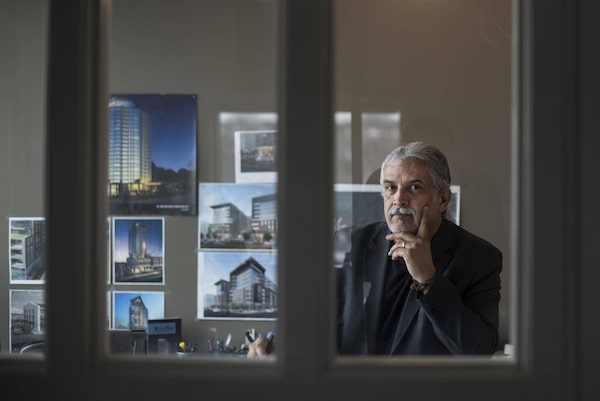
Roberto Menendez, director of design, WM Fares Group, poses in the company's office in Halifax on Feb. 11, 2018.Darren Calabrese
Roberto Menendez, 59, is director of design at WM Fares Group and personally is the developer of a complex of affordable housing and artists' studios in Halifax.
When I came to Canada from El Salvador, I was confronted with the painful reality the poor are surrounded by wealth. In addition, there's winter – at least in Latin America, you have nice weather. On the other hand, you don't have earthquakes and landslides that take out communities. Canadians like Latinos, so being accepted was a little easier. People pick up our accents, lower their guard.
I worked on a coffee plantation from my early years. At 15, I recorded counts, working beside the man who measured beans. I used to look at those structures; my dream was to design housing. I graduated with a master in architecture in 1985, married in 1986, came to Canada in March, 1987, and our son was born six months later.
El Salvador had a very brutal civil war – it's complex because poverty is an effect of bigger problems. Because I grew up facing poverty, my outlook was different. I thank God I was exposed to a reality that gave me tools to become who I became, with [a sense of] social justice. I always like to be a better person – that's the "catchy phrase."
When we're open to learning, we develop experience. I got a masters in international development at Saint Mary's University because of my deep passion for development. We have enough resources to solve the problems of the world but it's purely greed in the world's structures. Then I taught for a year. I love to teach critical thinking and problem solving – not to panic!
I have two hats. I'm doing wonderful development in support and design but financing my personal social project. My wife and I got a property, designed it and created affordable housing; 24 residences and 11 studios.
To design, build and manage it fulfilled my life goal, fills my heart and makes me happy. I couldn't have done it without my job because I had to pay bills; we had to mortgage everything. Putting affordable housing in this market isn't easy, I swear to God. My wife was 100 per cent supportive. She's pragmatic, as most women are, because women are the ones who carry the load. I'm pro-women because I grew up with a single mother.
When you're single you're fearless; when you have a family, you have responsibilities. My wife had a financial background, went to community college here, then worked in information technology. My philosophy is God has given me one day to live; I choose to live it in a relationship with myself, my wife, people in the office.
I'm a pragmatic idealist, defined by faith and values as a person, husband, professional and by liberation theology – which is big in Latin America. I did an Atlantic School of Theology diploma, ran a development and peace group, helped reconstruction programs for El Salvador, helped a poverty group. We helped create community enterprises where people could have dignity, work and have ownership, like Street Feat newspaper [closed in 2014 after 17 years].
I try to create an environment of peace and harmony – and have fun. We're a team of nine; they're experienced with computers, but if the lights go out I continue working because I use my hands.
I'm a minimalist in design because it's simple economically. I came from a tiny country, so by nature, I make the best use of resources and place. I hate waste. I'm guided by functionality and rationality.
Millennials want to sit in the kitchen, have a drink, tapas. When I came here, there were dining rooms people used two times a year. Open-concept kitchens? Islands? Phenomenal. That was Cape Breton 100 years ago – they gathered in the kitchen because it was warm.
I don't look typical Salvadorian, like a guy people think is an architect. My office is my cave. I know where everything is. I'm efficient and practical; it's easier to have my files here because I get calls every day from developers.
I like to bring tranquillity and peace to projects, use organic landscaping like rocks. Art, paintings are important. We're too busy and don't need busy environments. If I had the opportunity to study more architecture I'd spend a year in Japan.
This interview has been edited and condensed.